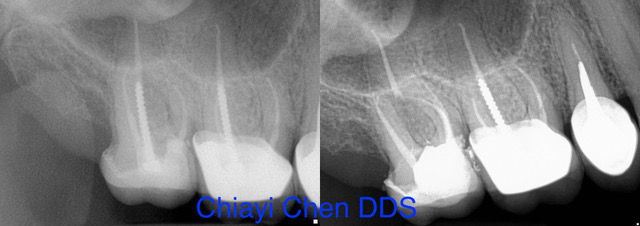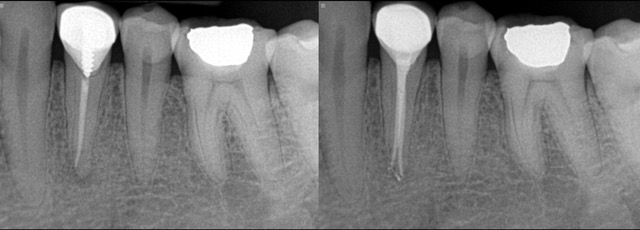Root Canal Re-Treatment
Root canal re-treatment is an imperative dental procedure designed to salvage a tooth that has previously undergone root canal therapy but requires further attention due to complications or unresolved issues. When the initial root canal treatment fails and causes persistent pain or infection, it becomes necessary for a skilled endodontist to perform a re-treatment. This meticulous process involves meticulously removing the existing filling material and thoroughly cleaning the canals of any residual bacteria or infected tissue.
There are several reasons why someone might need a root canal re-treatment. It could be due to missed canals during the first treatment, complex anatomy of roots that made it difficult to reach all areas of infection, persistent symptoms like pain or swelling even after initial treatment, or development of new decay or fractures in treated teeth.

Reasons for Root Canal Re-Treatment
- Incomplete initial treatment: Sometimes, during the initial root canal treatment, some canals or branches of the tooth's nerve system may be missed. This can lead to persistent infection and discomfort.
- New infection: Over time, a previously treated tooth can become reinfected due to new bacteria entering the tooth through cracks, decay, or faulty restorations.
- Delayed crown placement: After a root canal procedure, it is essential to have a dental crown placed over the treated tooth to protect it from further damage. If this step has been delayed or not done at all, there is an increased risk of reinfection.
- Cracked or fractured tooth: A cracked or fractured tooth may allow bacteria to enter and infect the root canal system even after successful treatment.
- Saliva contamination: If saliva contaminates the inside of the treated tooth before it is sealed with a final restoration like a filling or crown, bacteria can cause reinfection.
- Deterioration of previous restoration: The sealant used in root canal treatments might deteriorate over time due to wear and tear or poor oral hygiene habits. This deterioration creates an opportunity for bacterial recontamination.
- Injury or trauma: Any physical injury that affects a previously treated tooth could require re-treatment if it damages the previous root canal work.
Remember that these are just potential reasons why someone might need a root canal re-treatment; consult your endodontist for proper diagnosis and advice tailored specifically to your situation.

Signs That You May Need a Root Canal Re-Treatment
- Persistent pain: If you are experiencing persistent pain in the tooth that had previously undergone a root canal treatment, it could be an indication of reinfection or incomplete removal of infected tissue.
- Swelling and sensitivity: Swelling around the affected area coupled with sensitivity to hot or cold temperatures can be signs that the root canal has failed and requires re-treatment.
- Gum abscess: A gum abscess near a previously treated tooth may indicate that bacteria have entered the root canal system again, causing infection.
- Tooth discoloration: Sudden discoloration of the tooth can suggest internal damage or decay, which might require re-treatment.
- Loose crown or filling: If your dental crown or filling becomes loose after a root canal treatment, it is essential to seek professional evaluation as it may be cause for re-treatment.
- X-ray findings: Regular dental checkups include X-rays to monitor any changes in your teeth and roots over time. These images can reveal signs such as new infections or persistent infection despite previous treatment.
Remember, these signs are not definitive proof that you need root canal re-treatment. They only serve as indicators that warrant further examination by your endodontist. Seeking prompt attention from an experienced endodontist will help determine if re-treatment is necessary to save your tooth and restore oral health effectively.
The Procedure of a Root Canal Re-Treatment
The procedure of a root canal re-treatment is similar to that of an initial root canal treatment, but there are some key differences.
The endodontist will start by taking X-rays to assess the condition of the tooth and determine if re-treatment is necessary. They will also administer local anesthesia to ensure your comfort throughout the procedure. Next, they will carefully remove any previous filling material and clean out the canals thoroughly. This may involve using special tools to remove stubborn bacteria or debris. Once the canals are cleaned, they will be reshaped and disinfected before being filled with a new rubber-like material called gutta-percha. The endodontist may also place a temporary filling on top for added protection.
In some cases, additional appointments may be needed to complete the re-treatment process. This allows for further cleaning and disinfection before sealing off the canals permanently. After completing the root canal re-treatment, your endodontist will recommend placing a dental crown over the treated tooth for added strength and protection.
While a root canal re-treatment may sound complex, it is a common procedure that aims to save your natural tooth from extraction. Always consult with your endodontist if you have any concerns or questions about this procedure.
Conclusion
Root canal re-treatment may be necessary if a previous root canal procedure hasn't been successful or if new issues arise with the tooth. It is important to recognize the signs that you may need re-treatment, such as persistent pain or swelling around the affected tooth.
When it comes to undergoing a root canal re-treatment, don't fret! The procedure is similar to a standard root canal but involves removing any existing filling material and thoroughly cleaning and disinfecting the canals before applying new filling material.
Remember, regular dental checkups are crucial for maintaining good oral health and catching any potential problems early on. If you suspect that your previous root canal treatment may need to be redone, don't hesitate to consult with your endodontist.
Wish to learn more? Contact Big Apple Endodontics at (212) 980-7857 or visit our dental office located at 121 East 60th Street, Suite 4A, New York, NY 10022.
Office Hours
MON9:00 am - 4:00 pm
TUE7:00 am - 4:00 pm
WED - FRI9:00 am - 4:00 pm
SAT - SUNClosed


